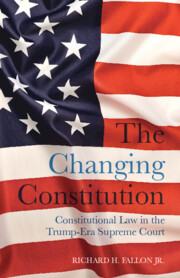Book contents
- The Changing Constitution
- The Changing Constitution
- Copyright page
- Dedication
- Contents
- Introduction
- 1 The Written Constitution and the Emergence of Judicial Supremacy
- 2 Historical Overview of Constitutional Adjudication by the Supreme Court
- 3 The Supreme Court Today
- 4 Freedom of Religion
- 5 The Freedom of Speech
- 6 The Expanding and Contested “Right to Keep and Bear Arms”
- 7 The Equal Protection of the Laws
- 8 Substantive Due Process and Unenumerated Fundamental Rights after the Overruling of Roe v. Wade
- 9 The Shrinking yet Still Formidable Powers of Congress
- 10 The Powers of the President and the Executive Branch in a Period of Ferment
- 11 Law and Change in the Supreme Court
- Index
9 - The Shrinking yet Still Formidable Powers of Congress
Published online by Cambridge University Press: 21 August 2025
- The Changing Constitution
- The Changing Constitution
- Copyright page
- Dedication
- Contents
- Introduction
- 1 The Written Constitution and the Emergence of Judicial Supremacy
- 2 Historical Overview of Constitutional Adjudication by the Supreme Court
- 3 The Supreme Court Today
- 4 Freedom of Religion
- 5 The Freedom of Speech
- 6 The Expanding and Contested “Right to Keep and Bear Arms”
- 7 The Equal Protection of the Laws
- 8 Substantive Due Process and Unenumerated Fundamental Rights after the Overruling of Roe v. Wade
- 9 The Shrinking yet Still Formidable Powers of Congress
- 10 The Powers of the President and the Executive Branch in a Period of Ferment
- 11 Law and Change in the Supreme Court
- Index
Summary
This chapter surveys current doctrine concerning the scope of Congress’s regulatory, taxing, and spending powers. The Court’s historic pattern of decisions both presents a study in constitutional change and illumines factors that sometimes make change difficult. Prior to the Great Depression and the New Deal, the Court struggled uncertainly to cabin Congress’s powers under Article I. But the Court, seemingly in response to political pressures, substantially abandoned that effort in 1937, when it began to interpret the Commerce Clause as giving Congress vast powers to regulate the national economy and the Taxing and Spending Clause as allowing it to create largesse-dispensing programs that the Founding generation could not have imagined. At least since the 1980s, a strain of conservative scholarship has maintained that the modern, swollen national government finds no justification in the original Constitution and that the Court should enforce the original design. This chapter traces the Court’s limited success in implementing a course correction and identifies the considerations that have given pause to conservative justices. It also describes the Court’s more aggressive efforts to limit congressional power under the Thirteenth, Fourteenth, and Fifteenth Amendments, all of which include express authorizations of Congress to “enforce” their substantive guarantees.
Keywords
Information
- Type
- Chapter
- Information
- The Changing ConstitutionConstitutional Law in the Trump-Era Supreme Court, pp. 239 - 267Publisher: Cambridge University PressPrint publication year: 2025
Accessibility standard: WCAG 2.0 A
Why this information is here
This section outlines the accessibility features of this content - including support for screen readers, full keyboard navigation and high-contrast display options. This may not be relevant for you.Accessibility Information
Content Navigation
Allows you to navigate directly to chapters, sections, or non‐text items through a linked table of contents, reducing the need for extensive scrolling.
Provides an interactive index, letting you go straight to where a term or subject appears in the text without manual searching.
Reading Order & Textual Equivalents
You will encounter all content (including footnotes, captions, etc.) in a clear, sequential flow, making it easier to follow with assistive tools like screen readers.
Structural and Technical Features
You gain clarity from ARIA (Accessible Rich Internet Applications) roles and attributes, as they help assistive technologies interpret how each part of the content functions.
